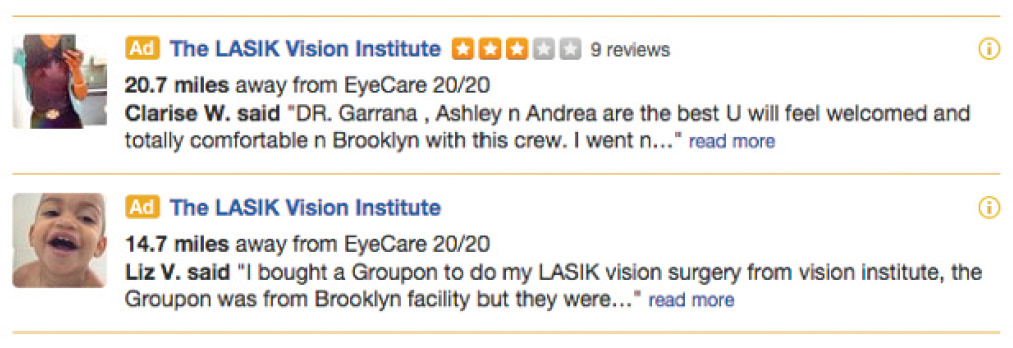

A customer's review of a business is nothing new, but in 2004, Yelp rebuilt the wheel to one that businesses could roll with online by allowing customers to review and rate businesses from anywhere. Although Yelp initially only pertained to the restaurant business, reviewers have taken to offering opinions on others such as retail stores and doctors' offices. Now, physicians can see patients' reviews online. That is great, right? Well, do not jump to that conclusion too quickly.
When a new tool enters an industry, adjustments need to be made. It is therefore important to recognize the challenges that exist when building your Yelp presence and to understand what alternatives you have if you decide not to. (Just a hint from us here: you very well may want to choose not to.)
WHAT ARE THE CHALLENGES?
One of the challenges of Yelp is the controversy over advertising (Figure). Your business can buy advertisements to be shown on Yelp and become a sponsored business page. Your business will then be posted on the landing pages of your competitors. What about ads from other competing practices on your Yelp business page? Yes, that happens. Yelp posts the ads of competing practices on your business page, and that does not seem fair. Unfortunately, the only way to get the competing ads removed from your business page is if you choose to advertise yourself. This means spending money that you may not have. If the ads are not necessarily in your budget for this quarter, patients who visit your business page to review their experience may be ushered to another doctor's page. Imagine if there were a doctor's representative in your office and, every time a new patient came in, the former talked the latter out of checking in for his or her appointment. That is essentially what Yelp is doing.

Figure. Yelp posts the advertisements of competing practices on your business page.
Speaking of budgets, Yelp requires that you commit to a 12-month contract if you choose to advertise. If you choose not to run advertisements, there is no telling exactly what will happen to the good reviews. If a patient has a good experience and shares it, Yelp may delete it. This brings us to the second challenge: the Recommendation Software.
When you put a review on Yelp, it runs through a filter, and there is no guarantee that your review will be posted on the business page. (Why should you trust a review site that cannot guarantee something?) It is really a game of posting roulette, which is a shame. When a patient takes the time to write a review, whether it is positive or negative, the feedback is important to your business and how you adapt. The review filter's algorithm is tricky, and many who have tried and keep trying cannot crack it. The rule of thumb seems to be that, if you want your review not to be “filtered” (ie, taken off the page), then the patient posting it must have a Yelp presence. This means that he or she has to have written reviews before. If the reviewer only has created one review before and it was positive, the review is likely to be filtered. Why? Because it is assumed to be fake, unreliable, or from a party paid by the business to make a positive review.
At a Glance
• Yelp now includes reviews of businesses, including
medical practices.
• Yelp is associated with numerous challenges such as
the opportunity for competitors to buy ads on your
landing page. The only way to stop this is to buy
Yelp ads.
• There are alternatives to Yelp such as Facebook and
Google+.
There is nothing you can do to ensure your patients are all working on their Yelp presence. You could suggest to your patients that they offer reviews of their experiences, but Yelp does not recommend soliciting reviews, because it assumes they will all be positive (which is not necessarily true). Can you ever win here? Are you caught between a website and a hard place? Not necessarily.
THERE ARE ALTERNATIVES TO YELP
If Yelp is working for you, great, but if it is not, you have options. There are other places to host a page for your local business that can be even better.
The first is Facebook. Sure, it started out as just a social networking platform, but now, it can be used to showcase your business. People can “like” and “share” your business page as well as leave reviews. When visiting a page, patients can view the reviews a few different ways: by the star rating, the most helpful review, and the most recent. Because of Facebook's easy-to-use interface, it is very simple to have a candid conversation with your patient, allowing you to follow up on his or her comments and to continue building a relationship. As a bonus, Facebook is more aesthetically pleasing to the eye than Yelp's design.
The second alternative is Google+, a social network tied to your Gmail account. As with Facebook, users can search reviews by ratings, by the most recent, and by the most helpful. Patients may also choose to share reviews, making it easy to pass along news to friends. Another benefit of your hosting reviews on Google+ is that it will help increase your search engine optimization rating and make your page more easily searchable for existing and prospective patients.
LET'S REVIEW
If you take the time to build a presence on Yelp, then there is the potential for a good return on investment, but beware. Caution: we really mean beware. As with many things in your business, take the time to try different approaches. Yelp may work well for some businesses, but it is not the best fit for everyone. Certainly, it is not our favorite. n
Section Editor Cary M. Silverman, MD, MBA
• medical director of EyeCare 20/20 in East Hanover, New Jersey
• csilverman@eyecare2020.com; Twitter @The LASIKdoc
Shama Hyder
• best-selling author, speaker, and president of The Marketing Zen
Group in Dallas
• shama@marketingzen.com; Twitter @Shama






